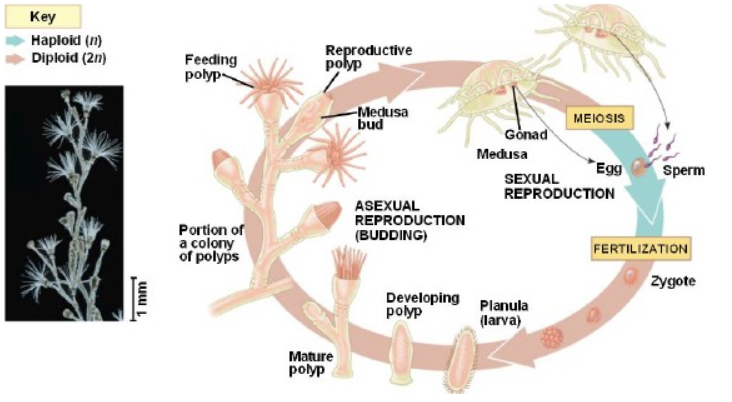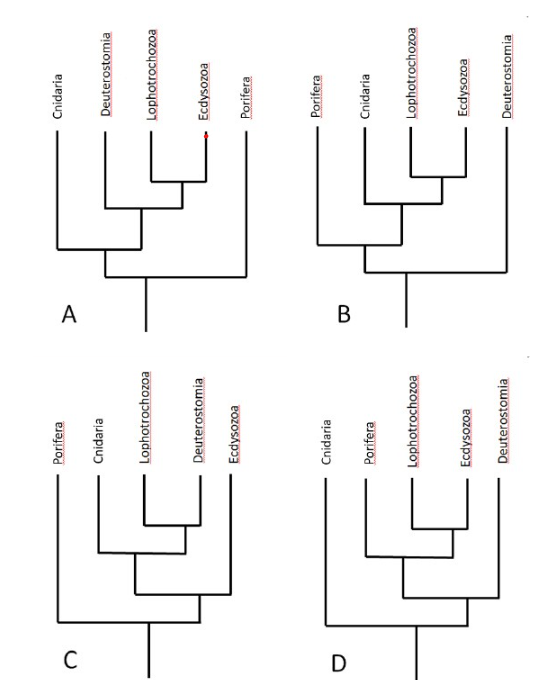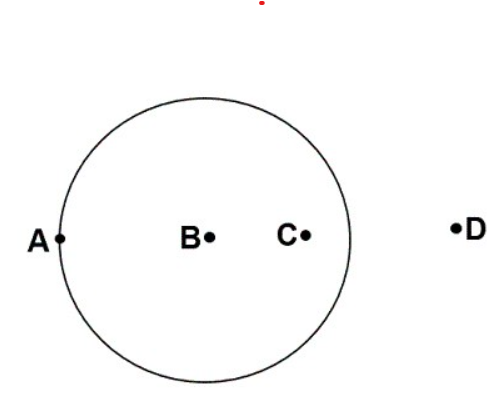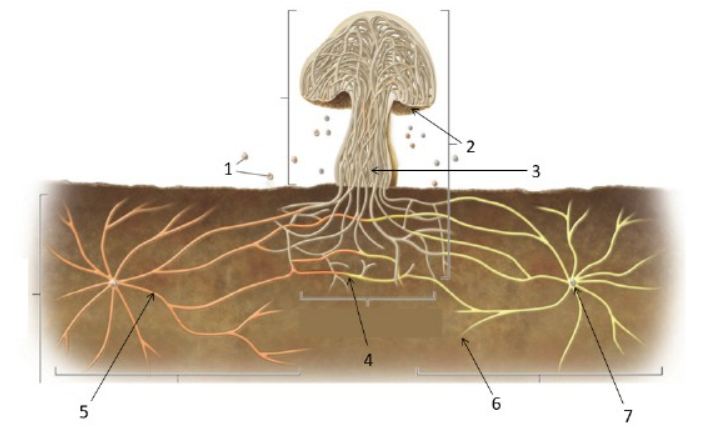BIO2 EXAM 3 PRACTICE TEST
1/39
There's no tags or description
Looks like no tags are added yet.
Name | Mastery | Learn | Test | Matching | Spaced | Call with Kai |
|---|
No analytics yet
Send a link to your students to track their progress
40 Terms
You find a population of terrestrial vertebrates living in the Atacama desert in Chile. Which adaptation would you most expect to find in these organisms?
Amniotic egg
Ophiuroidea, Asteroidea, Echinoidea and Scyphozoa all share the following trait
Adults display radial symmetry
You’ve come across a small, sessile organism sprouting from the ground. You’re not sure if you’ve found a fungus or a plant. Which of the following tests could help you determine this?
Chemically testing what the cell wall is made of.
A fungicide is released into an apple tree farm, and afterwards the trees in that patch grow slower than those located in other areas. What best explains what might have happened?
The fungicide killed the area’s mycorrhizal fungi.
According to the fossil record, Homo sapiens first arose in
Africa
Reptiles and mammals have . This allowed for the development of an amniotic egg which helps prevent .
internal fertilization…..desiccation of the embryo.
True muscle tissue and kidneys arise…
From the mesoderm in triploblastic animals only
Which of the following is/are common characteristic(s) of animals?
All of these answers are common characteristics of animals
You find a reptile-like vertebrate with the following characteristics
scales, four-chambered heart, ectothermy, and amniotic egg. To which group does this animal most likely belong?
Modern evidence suggests that Homo sapiens mated with members of this other species of hominin, which is shorter than Homo sapiens, has a larger brain, and originated in Europe
Homo neanderthalensis
You find a tetrapod, but can’t tell if it is actually a reptile or an amphibian. Discovering which of the following characteristics of the animal would be LEAST helpful in determining its identity?
That it is an ectotherm.
Which two organisms below are the most closely related to each other? 1Chimp, 2gorilla, 3new world monkey, 4emur, 5human
1 and 5
Which of the following is considered a likely explanation for the events of the Cambrian explosion?
Complex predator-prey relationships and increased atmospheric oxygen levels promoted animal diversification.
A student encounters an animal embryo at the eight-cell stage. The four smaller cells that comprise the top half of the embryo are directly above the four underlying cells. If we were to separate these eight cells and attempt to culture them individually, then what is most likely to happen?
Each cell may develop into a normal embryo that is a clone of the other seven cells
You find a homeothermic vertebrate that lays eggs. It could belong to one of which pair of groups?
birds or monotremes
A mushroom is
a structure with cells that have two copies of the genetic material.
Vertebrates and tunicates both have…
notochord
An aquatic predatory animal is a fast swimmer and chases prey through the ocean. Which of the following body plans would be most advantageous?
bilateral

This diagram represents the _ life cycle of a _.
Gametic, hydrozoan
Most of the growth at a fungal hyphal tip is accomplished directly through the mechanism of
Movement of water into the hyphae from the environment via osmosis.
All molluscs have a _
mantle

Which of the following phylogenetic tree of animals is accurate?
A
While scuba diving, your biology classmate was able to observe a marine animal that had a series of muscular tentacles that contain suckers that were connected to its head. According to your classmate, there was no shell or exoskeleton that could be observed, however he did remember a pair of large, fully developed eyes. Your classmate was able to observe an animal that belonged in which class?
Cephalopoda
Which of the following animals is NOT an ape?
Monkey
Which trait is found in ONLY ONE of these two groups
Chondrichthyans and Osteichthyans.
During chordate evolution, what is the sequence (from earliest to most recent) in which the following structures arose? 1. amniotic egg 2. vertebral column 3. Jaws 4. swim bladder 5. four-chambered heart
2, 3, 4, 1, 5

Below is a circular outline of a very old mycelium in a forest, as viewed from above, with four points labeled for this question, A-D. Which part of the fungus is the location where this mycelium most actively feeding and growing?
A
The water vascular system of echinoderms
functions in locomotion and feeding.
Rank the following traits in order of appearance in animal evolution 1. Bilateral symmetry 2. Cell specialization 3. Tissues 4. Endoskeleton
2, 3, 1, 4
You have a sponge in your new saltwater aquarium. Members of which of the following groups would be the best to try to feed to it?
Dinoflagellates
Which of the following animals is most closely related to Taylor Swift?
Sea star (Asteroidea)
Which of the following is NOT a characteristic of both animals and fungi?
rigid cells walls due to chitin layer
Which of the following statements about deuterostomes is true?
The first opening that forms during deuterostome gastrulation becomes the anus.
Cordyceps fungi infect insects in tropical forests and some Cordyceps species and other closely related species are able to affect the behavior of their insect host. For example Ophiocordyceps sinensis infects caterpillars that are hibernating in soil. Infection with O. sinensis causes the caterpillars to move to a vertical position, closer to the surface of the soil. After the caterpillar’s death, the fruiting body of the fungus emerges from the caterpillar body. Why would the characteristic of causing host caterpillars to have such behavior be advantageous, and selected for in cordycep fungi?
Because it increases spore dispersal
Your friend emails you for help with the identification of an elongated invertebrate that she has found in a moist forest in Africa. In her initial email, she describes the animal as having a complete digestive tract, a head, segmentation and appendages on each segment. You tell her that based on this information…
It could be an annelid or an arthropod. To be sure, you’d need to know whether the animal has a cuticle.
In both lichens and mycorrhizae, what does the fungal partner provide to its photosynthetic partner?
inorganic nutrients
Platyhelminthes can function without dedicated respiratory and circulatory systems because
none of their cells are far removed from the gastrovascular cavity or from the external environment

Below is a diagram of a fungus in a forest. Which of the following is true regarding the organism’s tissues at point 5?
This is multicellular haploid tissue.
Which of the following belongs to the lobe-fin clade?
horse
What was an early selective advantage of a coelom in animals? A coelom
contributed to a hydrostatic skeleton, allowing greater range of motion compared to organisms without body cavities